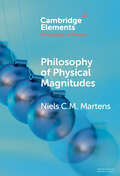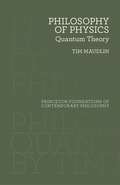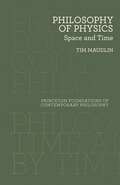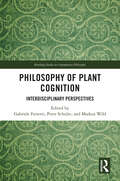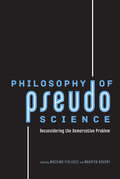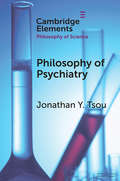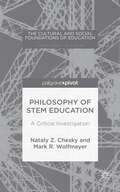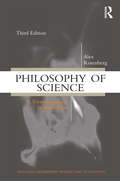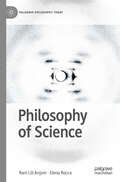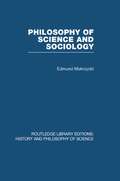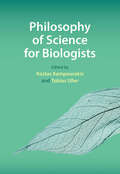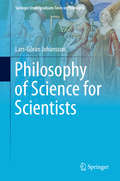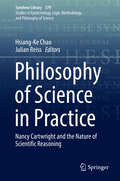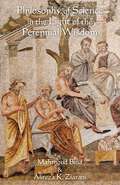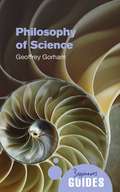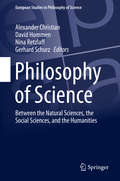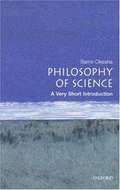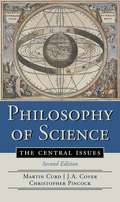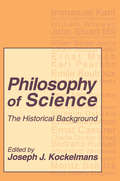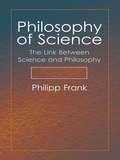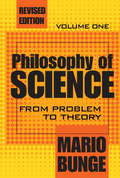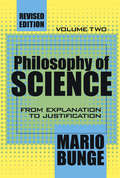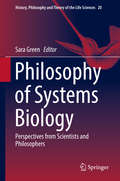- Table View
- List View
Philosophy of Microbiology
by Maureen A. O'MalleyMicrobes and microbiology are seldom encountered in philosophical accounts of the life sciences. Although microbiology is a well-established science and microbes the basis of life on this planet, neither the organisms nor the science have been seen as philosophically significant. This book will change that. It fills a major gap in the philosophy of biology by examining central philosophical issues in microbiology. Topics are drawn from evolutionary microbiology, microbial ecology, and microbial classification. These discussions are aimed at philosophers and scientists who wish to gain insight into the basic philosophical issues of microbiology.
Philosophy of Physical Magnitudes (Elements in the Philosophy of Physics)
by Niels C. MartensDimensional quantities such as length, mass and charge, i.e., numbers combined with a conventional unit, are essential components of theories in the sciences, especially physics, chemistry and biology. Do they represent a world with absolute physical magnitudes, or are they merely magnitude ratios in disguise? Would we notice a difference if all the distances or charges in the world suddenly doubled? These central questions of this Element are illustrated by imagining how one would convey the meaning of a kilogram to aliens if one were only allowed to communicate via Morse code.
Philosophy of Physics: Quantum Theory (Princeton Foundations Of Contemporary Philosophy Ser. #19)
by Tim MaudlinA sophisticated and original introduction to the philosophy of quantum mechanics from one of the world’s leading philosophers of physicsIn this book, Tim Maudlin, one of the world’s leading philosophers of physics, offers a sophisticated, original introduction to the philosophy of quantum mechanics. The briefest, clearest, and most refined account of his influential approach to the subject, the book will be invaluable to all students of philosophy and physics.Quantum mechanics holds a unique place in the history of physics. It has produced the most accurate predictions of any scientific theory, but, more astonishing, there has never been any agreement about what the theory implies about physical reality. Maudlin argues that the very term “quantum theory” is a misnomer. A proper physical theory should clearly describe what is there and what it does—yet standard textbooks present quantum mechanics as a predictive recipe in search of a physical theory.In contrast, Maudlin explores three proper theories that recover the quantum predictions: the indeterministic wavefunction collapse theory of Ghirardi, Rimini, and Weber; the deterministic particle theory of deBroglie and Bohm; and the conceptually challenging Many Worlds theory of Everett. Each offers a radically different proposal for the nature of physical reality, but Maudlin shows that none of them are what they are generally taken to be.
Philosophy of Physics: Space and Time (Princeton Foundations of Contemporary Philosophy #11)
by Tim MaudlinPhilosophical foundations of the physics of space-timeThis concise book introduces nonphysicists to the core philosophical issues surrounding the nature and structure of space and time, and is also an ideal resource for physicists interested in the conceptual foundations of space-time theory. Tim Maudlin's broad historical overview examines Aristotelian and Newtonian accounts of space and time, and traces how Galileo's conceptions of relativity and space-time led to Einstein's special and general theories of relativity. Maudlin explains special relativity with enough detail to solve concrete physical problems while presenting general relativity in more qualitative terms. Additional topics include the Twins Paradox, the physical aspects of the Lorentz-FitzGerald contraction, the constancy of the speed of light, time travel, the direction of time, and more.Introduces nonphysicists to the philosophical foundations of space-time theoryProvides a broad historical overview, from Aristotle to EinsteinExplains special relativity geometrically, emphasizing the intrinsic structure of space-timeCovers the Twins Paradox, Galilean relativity, time travel, and moreRequires only basic algebra and no formal knowledge of physics
Philosophy of Plant Cognition: Interdisciplinary Perspectives (Routledge Studies in Contemporary Philosophy)
by Gabriele Ferretti, Peter Schulte, and Markus WildThis volume features new research about the philosophy of plant intelligence and plant cognition, one of the most intriguing and complex current debates at the intersection of biology, cognitive science and philosophy.The debate about plant cognition is marked by deep disagreements. Some theorists are confident that the empirical evidence supports the ascription of cognitive capacities to plants. Others hold that such claims are overblown, and defend more traditional, non-cognitive accounts of plant behavior. Still others seek to formulate intermediate positions. This volume brings together leading researchers from across this theoretical spectrum to tackle the foundational questions that are at issue in the debate about plant cognition. The contributions focus on the philosophical questions raised by recent discoveries and controversies in the empirical sciences, such as: Can plants be said to have genuine cognitive abilities? Can they be characterized as representing or perceiving their environment, as pursuing goals, or even as having some form of conscious experience? Which data could provide evidence for such characterizations? And what are possible implications of these issues for general questions about the nature of cognition, representation, perception, and consciousness?Philosophy of Plant Cognition will be of interest to scholars and students working in philosophy of mind, philosophy of biology, cognitive science, and plant biology.
Philosophy of Pseudoscience: Reconsidering the Demarcation Problem
by Massimo Pigliucci Maarten BoudryWhat sets the practice of rigorously tested, sound science apart from pseudoscience? In this volume, the contributors seek to answer this question, known to philosophers of science as OC the demarcation problem. OCO This issue has a long history in philosophy, stretching as far back as the early twentieth century and the work of Karl Popper. But by the late 1980s, scholars in the field began to treat the demarcation problem as impossible to solve and futile to ponder. However, the essays that Massimo Pigliucci and Maarten Boudry have assembled in this volume make a rousing case for the unequivocal importance of reflecting on the separation between pseudoscience and sound science. a a a a a a Moreover, the demarcation problem is not a purely theoretical dilemma of mere academic interest: it affects parentsOCO decisions to vaccinate children and governmentsOCO willingness to adopt policies that prevent climate change. Pseudoscience often mimics science, using the superficial language and trappings of actual scientific research to seem more respectable. Even a well-informed public can be taken in by such questionable theories dressed up as science. Pseudoscientific beliefs compete with sound science on the health pages of newspapers for media coverage and in laboratories for research funding. Now more than ever the ability to separate genuine scientific findings from spurious ones is vital, and The Philosophy of Pseudoscience provides ground for philosophers, sociologists, historians, and laypeople to make decisions about what science is or isnOCOt. aa
Philosophy of Psychiatry (Elements in the Philosophy of Science)
by Jonathan Y. TsouJonathan Y. Tsou examines and defends positions on central issues in philosophy of psychiatry. The positions defended assume a naturalistic and realist perspective and are framed against skeptical perspectives on biological psychiatry. Issues addressed include the reality of mental disorders; mechanistic and disease explanations of abnormal behavior; definitions of mental disorder; natural and artificial kinds in psychiatry; biological essentialism and the projectability of psychiatric categories; looping effects and the stability of mental disorders; psychiatric classification; and the validity of the DSM's diagnostic categories. The main argument defended by Tsou is that genuine mental disorders are biological kinds with harmful effects. This argument opposes the dogma that mental disorders are necessarily diseases (or pathological conditions) that result from biological dysfunction. Tsou contends that the broader ideal of biological kinds offers a more promising and empirically ascertainable naturalistic standard for assessing the reality of mental disorders and the validity of psychiatric categories.
Philosophy of STEM Education: A Critical Investigation
by Nataly Z. Chesky Mark R. WolfmeyerFramed as educational equality initiatives that will help students gain the knowledge they need to compete in the global marketplace, STEM may be the most indicative educational reform discourse of our time and has grown to become one of the primary foci of educational policy, in part due to association with a wide array of today's industries: from information and communications technology to the medical field, to sustainability innovations. This book's primary focus is to shift the attention away from such utilitarian aims and ask critical questions about what aims the STEM initiatives are asking for and what assumptions do they hold about both teaching STEM and the nature of STEM content. In order to answer the above questions, the authors use a philosophical lens to study STEM policies as a political and social phenomenon.
Philosophy of Science
by Alex RosenbergAny serious student attempting to better understand the nature, methods and justification of science will value Alex Rosenberg's updated and substantially revised Third Edition of Philosophy of Science: A Contemporary Introduction. Weaving together lucid explanations and clear analyses, the volume is a much-used, thematically oriented introduction to the field. New features of the Third Edition include more coverage of the history of the philosophy of science, more fully developed material on the metaphysics of causal and physical necessity, more background on the contrast between empiricism and rationalism in science, and new material on the structure of theoretical science (with expanded coverage of Newtonian and Darwinian theories and models) and the realism/antirealism controversy. Rosenberg also divides the Third Edition into fifteen chapters, aligning each chapter with a week in a standard semester-long course. Updated Discussion Questions, Glossary, Bibliography and Suggested Readings lists at the end of each chapter will make the Third Edition indispensable, either as a comprehensive stand-alone text or alongside the many wide-ranging collections of articles and book excerpts currently available. Read our interview with Alex Rosenberg, What exactly is philosophy of science - and why does it matter? here: www.routledge.com/u/alexrosenberg
Philosophy of Science (Palgrave Philosophy Today)
by Rani Lill Anjum Elena RoccaThis textbook is a comprehensive, engaging, and user-friendly introduction to philosophy of science written by a philosopher and a scientist. By exploring traditional debates within philosophy of science, as well as analysing contemporary scientific controversies for philosophical bias, the reader is invited to reflect upon how philosophical assumptions influence scientific theory, methods, and practice. Key features: Is an accessible introduction to philosophy of science written by a philosopher and a scientist. Includes some of the many important contributions from women philosophers and scientists. Demonstrates the philosophical influences on scientific thinking, practice, and expert disagreement. Applies philosophy of science to analyse some specific real-life cases of scientific controversy. This book is an essential resource for students and teachers in philosophy of science. It is also ideal for anyone interested in the philosophical influences on contemporary science.
Philosophy of Science and Sociology: From the Methodological Doctrine to Research Practice (Routledge Library Editions: History & Philosophy of Science)
by Edmund MokrzyckiOriginally published in 1983. This book concentrates on the impact of philosophy of science on sociology and other disciplines. It argues that the impact of the philosophy of science on sociology from the rise of the Vienna Circle until the mid-1980s resulted in a deep-reaching and, in the author’s view, undesirable methodological reorientation in sociology.
Philosophy of Science for Biologists
by Kostas Kampourakis Tobias UllerBiologists rely on theories, apply models and construct explanations, but rarely reflect on their nature and structure. This book introduces key topics in philosophy of science to provide the required philosophical background for this kind of reflection, which is an important part of all aspects of research and communication in biology. It concisely and accessibly addresses fundamental questions such as: Why should biologists care about philosophy of science? How do concepts contribute to scientific advancement? What is the nature of scientific controversies in the biological sciences? Chapters draw on contemporary examples and case studies from across biology, making the discussion relevant and insightful. Written for researchers and advanced undergraduate and graduate students across the life sciences, its aim is to encourage readers to become more philosophically minded and informed to enable better scientific practice. It is also an interesting and pertinent read for philosophers of science.
Philosophy of Science for Scientists
by Lars-Göran JohanssonThis textbook offers an introduction to the philosophy of science. It helps undergraduate students from the natural, the human and social sciences to gain an understanding of what science is, how it has developed, what its core traits are, how to distinguish between science and pseudo-science and to discover what a scientific attitude is. It argues against the common assumption that there is fundamental difference between natural and human science, with natural science being concerned with testing hypotheses and discovering natural laws, and the aim of human and some social sciences being to understand the meanings of individual and social group actions. Instead examines the similarities between the sciences and shows how the testing of hypotheses and doing interpretation/hermeneutics are similar activities. The book makes clear that lessons from natural scientists are relevant to students and scholars within the social and human sciences, and vice versa. It teaches its readers how to effectively demarcate between science and pseudo-science and sets criteria for true scientific thinking. Divided into three parts, the book first examines the question What is Science? It describes the evolution of science, defines knowledge, and explains the use of and need for hypotheses and hypothesis testing. The second half of part I deals with scientific data and observation, qualitative data and methods, and ends with a discussion of theories on the development of science. Part II offers philosophical reflections on four of the most important concepts in science: causes, explanations, laws and models. Part III presents discussions on philosophy of mind, the relation between mind and body, value-free and value-related science, and reflections on actual trends in science.
Philosophy of Science in Practice
by Hsiang-Ke Chao Julian ReissThis volume reflects the 'philosophy of science in practice' approach and takes a fresh look at traditional philosophical problems in the context of natural, social, and health research. Inspired by the work of Nancy Cartwright that shows how the practices and apparatuses of science help us to understand science and to build theories in the philosophy of science, this volume critically examines the philosophical concepts of evidence, laws, causation, and models and their roles in the process of scientific reasoning. Each chapter is an important one in the philosophy of science, while the volume as a whole deals with these philosophical concepts in a unified way in the context of actual scientific practice. This volume thus aims to contribute to this new direction in the philosophy of science.
Philosophy of Science in the Light of the Perennial Wisdom
by Mahmoud Bina Alireza K. ZiaraniBacked by its technological achievements, modern science appears as the de facto source of truth to the majority of our contemporaries. Its sole reliance on reason and empirical data gives it an air of objectivity that has conferred upon it an almost unquestioning authority. Against the backdrop of this pervasive scientism, Philosophy of Science in the Light of the Perennial Wisdom is a daring attempt to offer an intellectual critique of modern science in its foundation by rigorously examining the intrinsic limitations of rational thought and empirical investigation. Unique of its kind, this book offers a refreshing look at the traditional doctrines of epistemology and metaphysics as an antidote to the subjective as well as objective errors of modern science, which is thus revealed as no more than a belief system that falls radically short of offering a full knowledge of reality; this, in contrast to the perennial wisdom of the world's great religions that for millennia have offered humankind not only keys to true knowledge, but also the means of attaining it, which precisely constitutes man's reason for being.
Philosophy of Science: A Beginner's Guide (Beginner's Guides #20)
by Geoffrey GorhamSo the world didn't end on 10 September 2008, but the possibility may have got you thinking. Examining core philosophical issues facing scientists, Geoffrey Gorham probes such controversial issues as the Large Hadron Collider, intelligent design, the prospect of human extinction, space colonization, and much more. Geoffrey Gorham is Assistant Professor in Philosophy at the University of Wisconsin-Eau Claire.
Philosophy of Science: A Contemporary Introduction (Third Edition)
by Alex RosenbergAny serious student attempting to better understand the nature, methods and justification of science will value Alex Rosenberg's updated and substantially revised Third Edition of Philosophy of Science: A Contemporary Introduction. Weaving together lucid explanations and clear analyses, the volume is a much-used, thematically oriented introduction to the field. New features of the Third Edition include more coverage of the history of the philosophy of science, more fully developed material on the metaphysics of causal and physical necessity, more background on the contrast between empiricism and rationalism in science, and new material on the structure of theoretical science (with expanded coverage of Newtonian and Darwinian theories and models) and the realism/antirealism controversy. Rosenberg also divides the Third Edition into fifteen chapters, aligning each chapter with a week in a standard semester-long course. Updated Discussion Questions, Glossary, Bibliography and Suggested Readings lists at the end of each chapter will make the Third Edition indispensable, either as a comprehensive stand-alone text or alongside the many wide-ranging collections of articles and book excerpts currently available. Read our interview with Alex Rosenberg, What exactly is philosophy of science - and why does it matter? here: www. routledge. com/u/alexrosenberg
Philosophy of Science: A Unified Approach (European Studies In Philosophy Of Science Ser. #9)
by Gerhard Schurz Alexander Christian David Hommen Nina RetzlaffThis broad and insightful book presents current scholarship in important subfields of philosophy of science and addresses an interdisciplinary and multidisciplinary readership. It groups carefully selected contributions into the four fields of I) philosophy of physics, II) philosophy of life sciences, III) philosophy of social sciences and values in science, and IV) philosophy of mathematics and formal modeling. Readers will discover research papers by Paul Hoyningen-Huene, Keizo Matsubara, Kian Salimkhani, Andrea Reichenberger, Anne Sophie Meincke, Javier Suárez, Roger Deulofeu, Ludger Jansen, Peter Hucklenbroich, Martin Carrier, Elizaveta Kostrova, Lara Huber, Jens Harbecke, Antonio Piccolomini d’Aragona and Axel Gelfert. This collection fosters dialogue between philosophers of science working in different subfields, and brings readers the finest and latest work across the breadth of the field, illustrating that contemporary philosophy of science has successfully broadened its scope of reflection. It will interest and inspire a wide audience of philosophers as well as scholars of the natural sciences, social sciences and the humanities. The volume shares selected contributions from the prestigious second triennial conference of the German Society for Philosophy of Science/ Gesellschaft für Wissenschaftsphilosophie (GWP.2016, March 8, 2016 – March 11, 2016).
Philosophy of Science: A Very Short Introduction
by Samir OkashaWhat is science? Is there a real difference between science and myth? Is science objective? Can science explain everything? This Very Short Introduction provides a concise overview of the main themes of contemporary philosophy of science. Beginning with a short history of science to set the scene, Samir Okasha goes on to investigate the nature of scientific reasoning, scientific explanation, revolutions in science, and theories such as realism and anti-realism. He also looks at philosophical issues in particular sciences, including the problem of classification in biology, and the nature of space and time in physics. The final chapter touches on the conflicts between science and religion, and explores whether science is ultimately a good thing.
Philosophy of Science: The Central Issues
by Christopher Pincock Martin Curd J. A. CoverBoth an anthology and an introductory textbook, Philosophy of Science: The Central Issues offers instructors and students a comprehensive anthology of fifty-two primary texts by leading philosophers in the field and provides extensive editorial commentary that places the readings in a wide philosophical context.
Philosophy of Science: The Historical Background
by Joseph J. KockelmansThis anthology of selections from the works of noted philosophers affords the student an immediate contact with the unique historical background of the philosophy of science. The selections, many of which have not been readily accessible, follow the development of the philosophy of science from 1786 to 1927. Each selection is preceded by a brief introduction by the editor designed to familiarize the reader with a particular philosopher and provide insights into his work.Joseph J. Kockelmans divides the selections into several sections. Part 1, from 17861850, includes chapters by Immanuel Kant, on the metaphysical foundations of natural science, John Frederick William Herschel, on experience and the analysis of phenomena, William Whewell, on the nature and conditions of inductive science, and John Stuart Mill, on induction and the law of universal causation; part 2, from 18701899, includes chapters by Hermann Von Helmholtz, on the origin and significance of geometrical axioms, William Stanley Jevons, on the philosophy of inductive inference, John Bernard Stallo, on the kinetic theory of gasses and the conditions of the validity of scientific hypotheses, Ernst Mach, on the economical nature of physical inquiry, Karl Pearson, on perceptual and conceptual space, Emile Boutroux, on mechanical laws, Heinrich Hertz, on the appropriateness, correctness, and permissibility of scientific theories, and Ludwig Boltzmann, on the fundamental principles and basic equations of mechanics.The third part, covering the first decade of the twentieth century, includes chapters by Henri Jules Poincare, on science and reality, Charles Peirce, on Induction, Pierre Marie Duhem, on the laws of physics, William Ostwald, on energetism and mechanics, Emile Meyerson, on identity of thought and nature as the final goal of science, Ernst Cassirer, on functional concepts of natural science; part 4, from 19101927, includes chapters by Charles Dunbar Broad, on phenomenalism, Alfred North Whitehead, on time, space, and material, Bertrand Russell, on the world of physics and the world of sense, Norman Robert Cambbell, on the meaning of science, Moritz Schlick, on basic issues of the philosophy of natural science, and Percy Williams Bridgman, on the concepts of space, time, and causality.Philosophy of Science provides a concise single volume text to the discipline and enables students to understand and evaluate the various trends in our contemporary philosophy of science.Joseph J. Kockelmans is professor emeritus of philosophy at the Pennsylvania State Univers
Philosophy of Science: The Link Between Science and Philosophy
by Philipp FrankA great mathematician and teacher bridges the gap between science and the humanities in this exposition of the philosophy of science. Philipp Frank, a distinguished physicist and philosopher in his own right, traces the history of science from Aristotle to Einstein to illustrate philosophy’s ongoing role in the scientific process.Suitable for undergraduate students and other readers, this volume explains modern technology’s role in the gradual erosion of the rapport between physical theories and philosophical systems, and offers suggestions for restoring the link between these related areas. Dr. Frank examines the ancient Greek concept of natural science to illustrate the development of modern science; then, using geometry as an example, he charts its progress from Euclidean principles through the interpretations of Descartes, Mill, Kant, and the rise of four-dimensional and non-Euclidean geometry. Additional topics include the laws of motion, before and after innovations of Galileo and Newton; perceptions of motion, light, and relativity through the ages; metaphysical interpretations of relativistic physics; the motion of atomic objects and the phenomena and formulations of atomic physics; and the principle of causality and the validation of theories.
Philosophy of Science: Volume 1, From Problem to Theory
by Mario BungeOriginally published as Scientific Research, this pair of volumes constitutes a fundamental treatise on the strategy of science. Mario Bunge, one of the major figures of the century in the development of a scientific epistemology, describes and analyzes scientific philosophy, as well as discloses its philosophical presuppositions. This work may be used as a map to identify the various stages in the road to scientific knowledge.Philosophy of Science is divided into two volumes, each with two parts. Part 1 offers a preview of the scheme of science and the logical and semantical took that will be used throughout the work. The account of scientific research begins with part 2, where Bunge discusses formulating the problem to be solved, hypothesis, scientific law, and theory.The second volume opens with part 3, which deals with the application of theories to explanation, prediction, and action. This section is graced by an outstanding discussion of the philosophy of technology. Part 4 begins with measurement and experiment. It then examines risks in jumping to conclusions from data to hypotheses as well as the converse procedure.Bunge begins this mammoth work with a section entitled "How to Use This Book." He writes that it is intended for both independent reading and reference as well as for use in courses on scientific method and the philosophy of science. It suits a variety of purposes from introductory to advanced levels. Philosophy of Science is a versatile, informative, and useful text that will benefit professors, researchers, and students in a variety of disciplines, ranging from the behavioral and biological sciences to the physical sciences.
Philosophy of Science: Volume 2, From Explanation to Justification
by Mario BungeOriginally published as Scientific Research, this pair of volumes constitutes a fundamental treatise on the strategy of science. Mario Bunge, one of the major figures of the century in the development of a scientific epistemology, describes and analyzes scientific philosophy, as well as discloses its philosophical presuppositions. This work may be used as a map to identify the various stages in the road to scientific knowledge.Philosophy of Science is divided into two volumes, each with two parts. Part 1 offers a preview of the scheme of science and the logical and semantical took that will be used throughout the work. The account of scientific research begins with part 2, where Bunge discusses formulating the problem to be solved, hypothesis, scientific law, and theory.The second volume opens with part 3, which deals with the application of theories to explanation, prediction, and action. This section is graced by an outstanding discussion of the philosophy of technology. Part 4 begins with measurement and experiment. It then examines risks in jumping to conclusions from data to hypotheses as well as the converse procedure.Bunge begins this mammoth work with a section entitled ""How to Use This Book."" He writes that it is intended for both independent reading and reference as well as for use in courses on scientific method and the philosophy of science. It suits a variety of purposes from introductory to advanced levels. Philosophy of Science is a versatile, informative, and useful text that will benefit professors, researchers, and students in a variety of disciplines, ranging from the behavioral and biological sciences to the physical sciences.
Philosophy of Systems Biology
by Sara GreenThe emergence of systems biology raises many fascinating questions: What does it mean to take a systems approach to problems in biology? To what extent is the use of mathematical and computational modelling changing the life sciences? How does the availability of big data influence research practices? What are the major challenges for biomedical research in the years to come? This book addresses such questions of relevance not only to philosophers and biologists but also to readers interested in the broader implications of systems biology for science and society. The book features reflections and original work by experts from across the disciplines including systems biologists, philosophers, and interdisciplinary scholars investigating the social and educational aspects of systems biology. In response to the same set of questions, the experts develop and defend their personal perspectives on the distinctive character of systems biology and the challenges that lie ahead. Readers are invited to engage with different views on the questions addressed, and may explore numerous themes relating to the philosophy of systems biology. This edited work will appeal to scholars and all levels, from undergraduates to researchers, and to those interested in a variety of scholarly approaches such as systems biology, mathematical and computational modelling, cell and molecular biology, genomics, systems theory, and of course, philosophy of biology.

